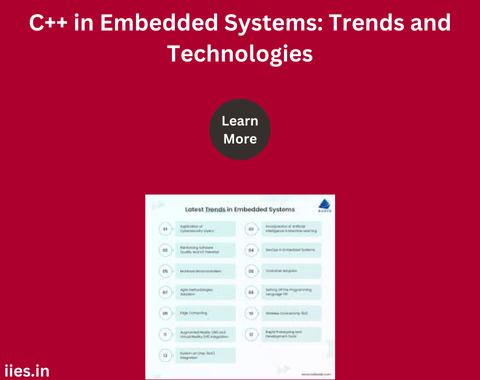1. The Evolution of C++ in Embedded Systems
C++ was initially designed as an extension of the C programming language, with added features to support object-oriented programming (OOP). While C has been the traditional language for embedded systems due to its close-to-hardware capabilities, C++ introduced more advanced features, such as classes, inheritance, and polymorphism, which allowed developers to write more modular and maintainable code. Over time, C++ has become more optimized for embedded environments, with compilers and tools that cater specifically to the needs of embedded developers.
2. Trends in C++ for Embedded Systems
Modern C++ Adoption: With the release of C++11 and subsequent versions (C++14, C++17, C++20, and beyond), the language has seen significant enhancements in terms of syntax, performance, and safety. Features like smart pointers, lambda expressions, and constexpr functions have become increasingly popular in embedded systems, enabling developers to write safer and more efficient code without sacrificing performance.
Real-Time Operating Systems (RTOS) Integration: As embedded systems often require real-time processing, the integration of C++ with RTOS has been a growing trend. Modern C++ features, such as threading and synchronization primitives, have made it easier to implement real-time applications. Moreover, RTOS vendors are increasingly providing C++ APIs, allowing developers to take full advantage of the language’s capabilities.
Embedded AI and Machine Learning: The rise of artificial intelligence (AI) and machine learning (ML) in embedded systems has led to new challenges and opportunities for C++ developers. C++ is being used to implement lightweight AI and ML models that can run on resource-constrained embedded devices. Libraries like TensorFlow Lite and ONNX Runtime have C++ interfaces, making it easier to integrate AI capabilities into embedded systems.
Safety and Security: As embedded systems are deployed in critical applications, such as automotive and healthcare, safety and security have become paramount. Modern C++ offers features like type safety, RAII (Resource Acquisition Is Initialization), and static analysis tools that help in writing safer code. Additionally, the trend towards using MISRA C++ guidelines ensures that code adheres to strict safety standards, reducing the risk of software failures.
Code Reusability and Portability: The demand for code reusability and portability in embedded systems is growing, especially as devices become more interconnected. C++’s object-oriented nature and support for generic programming allow developers to write reusable code that can be easily adapted to different hardware platforms. Furthermore, cross-compilation tools and frameworks like CMake have made it simpler to port C++ code across various embedded environments.
3. Technologies Shaping C++ in Embedded Systems
Microcontroller Development Platforms: The availability of powerful microcontroller development platforms, such as Arduino, STM32, and ESP32, has facilitated the use of C++ in embedded systems. These platforms often come with extensive libraries and development environments that support C++, allowing developers to quickly prototype and deploy embedded applications.
Embedded Systems Compilers and Toolchains: Compilers and toolchains specifically designed for embedded systems, like GCC (GNU Compiler Collection), Keil, and IAR Embedded Workbench, have evolved to better support modern C++. These tools provide optimizations for embedded targets, including memory management and low-level hardware interactions, ensuring that C++ code runs efficiently on resource-constrained devices.
Simulation and Debugging Tools: The complexity of embedded systems requires robust simulation and debugging tools. Tools like QEMU, GDB, and Segger J-Link offer comprehensive support for C++ in embedded environments. These tools allow developers to simulate embedded hardware, debug code, and perform real-time analysis, all of which are essential for ensuring the reliability and performance of embedded systems.
Standard Libraries and Frameworks: The use of standard libraries and frameworks in C++ for embedded systems is becoming more common. The Standard Template Library (STL), Boost, and embedded-specific frameworks like FreeRTOS with C++ bindings provide a wide range of functionalities, from data structures to multitasking, making it easier to develop complex embedded applications.
4. The Future of C++ in Embedded Systems
The future of C++ in embedded systems looks promising as the language continues to evolve with new standards and tools. The ongoing development of C++23 and beyond aims to introduce more features that cater to the needs of embedded developers, such as improved compile-time programming and better support for embedded hardware. Additionally, the growing importance of the Internet of Things (IoT) and edge computing is likely to drive further adoption of C++ in embedded systems, as these domains require high performance, low latency, and efficient use of resources—all strengths of C++.

